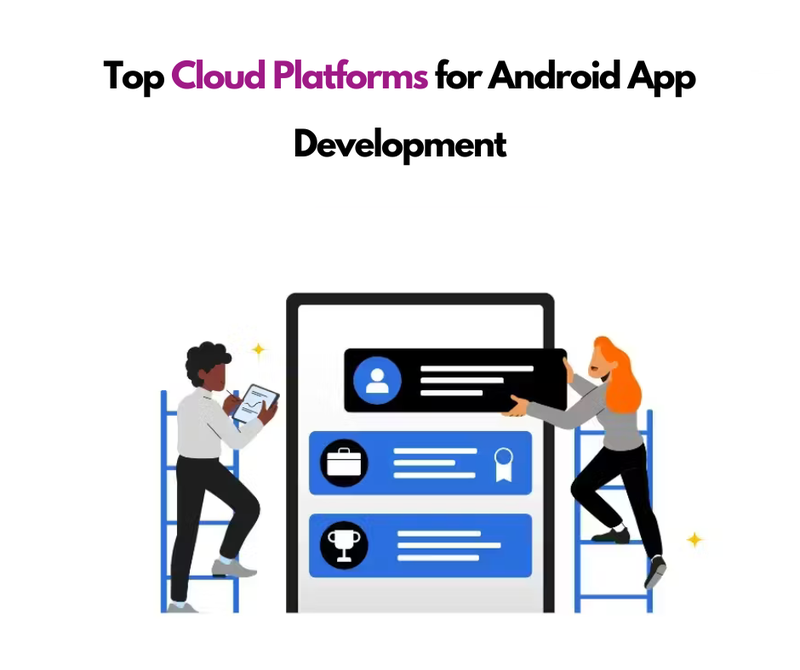Cloud Era Mobile Apps: Navigate the Future of Development
Remember the days when building an app had to juggle limited resources, suffer from scalability issues, and go through geo-restrictions? Those days are fading into the rearview mirror as the cloud era unleashes a progressive wave of options to enhance Android/IOS apps. Gone are the shackles of neighborhood hardware obstacles. Now imagine a mobile app that scales to hundreds of thousands of app users, adapts to changing demands in real-time, and delivers content globally at the speed of light. This is the fact of cloud-native mobile apps that utilize the unlimited potential of the cloud technology landscape.
Whether you're a professional developer, a promising entrepreneur, or a business owner venturing into the realm of mobile apps, this transformational shift demands your attention.

This complete blog post is your blueprint for navigating the exciting international improvement of cloud-native Apps, equipping you with the information and insights to limit its full capabilities.
Are you ready to:
- Break free from scalability constraints and embrace on-demand resources?
- Optimize costs with a pay-as-you-go model and accelerate development cycles?
- Reach a global audience with seamless accessibility and low latency?
- Leverage the power of cloud-based security, data management, and collaboration?
Unlocking the Power: Benefits of Cloud-Native Mobile Apps
The cloud has changed the way we build and deploy software, and mobile apps are no exception. By embracing cloud-native development technologies, you unlock a treasure trove of benefits that can catapult your mobile application to new heights. Let's examine some of the most compelling benefits:

Enhanced Scalability and Performance:
Gone are the days of worrying about server crashes due to an unexpected surge in users. Cloud infrastructure offers on-demand resources that automatically scale up or down as your application needs.
Imagine a Black Friday sale where your mobile application sees a tenfold traffic boom. With conventional strategies, you may face downtime or sluggish performance. But with the cloud, your application scales seamlessly to handle the influx, ensuring an easy and responsive experience for everyone.
This scalability is not always just theoretical. Observation by Right Scale found that cloud-first applications have 70% fewer overall performance-related incidents compared to on-premises deployments.
In addition, cloud providers use geographically distributed information centers and bring your application closer to app users around the world. This translates into reduced latency and lightning-fast performance, regardless of their region.
Cost Optimization and Efficiency:
Say goodbye to high prices for hardware and infrastructure upfront. The cloud works on a pay-as-you-go basis model, which means that you're best paying for the resources that your application simply uses.
This eliminates the need for expensive hardware investments and allows you to optimize your finances primarily based on actual usage.
But the financial benefits go beyond just the hardware. Cloud-native development also supports rapid improvement cycles through the use of pre-built elements and automated workflows. This means shorter development times and faster time to market, giving you a competitive advantage.
The price savings can be extensive. Gartner reports that a large business using cloud-native development for its mobile app reduced infrastructure costs by 70%, while simultaneously increasing developer productivity by 50%.
These are just a small number of examples and the cost savings per capacity depends on your unique application and usage patterns.
Global Reach and Accessibility:
Imagine reaching a global audience without having to worry about geographic restrictions. With completely cloud-based applications, you can deliver content to international customers with low latency and high availability. This will open up your app to new markets and segments of app users and expand your capacity exponentially.
In addition, the cloud infrastructure automatically optimizes overall performance for different devices and mobile operating systems. This ensures a continuous user experience in a huge number of smart devices, regardless of their specifications or region.
A perfect example of this global success is Netflix. Using the cloud, Netflix promises its streaming provider over two hundred million subscribers in one hundred and ninety countries.
This would not be viable with conventional infrastructure, which highlights the power of the cloud to connect your application to a decidedly global audience.
Additional Benefits:
The advantages of cloud-native Mobile apps extend far beyond scalability, cost, and reach. Here are some additional benefits to consider:
- Enhanced security: Cloud providers offer robust security measures to protect your app and user data, including encryption, intrusion detection, and access controls.
- Disaster recovery: Cloud infrastructure ensures data redundancy and disaster recovery capabilities, minimizing downtime and data loss in case of unforeseen events.
- Data management: Cloud-based solutions offer scalable and secure data storage and management options, simplifying data handling and analysis.
- Collaboration: Cloud platforms facilitate seamless collaboration among development teams, regardless of location, boosting productivity and efficiency.
By adopting native cloud developments, you get a comprehensive set of advantages that could revolutionize the success of your Android app.
Overcoming Challenges: Navigating the Cloud Development Landscape
The potential of the cloud for mobile app development is clear, but it's not without challenges. As you embark on your cloud-native journey, it's essential to be aware of potential obstacles and equip yourself with techniques to overcome them.

Security Concerns:
Security is a top concern for any developer considering the cloud. But before hitting the panic button, understand that major cloud providers like AWS, Azure, and GCP prioritize security with robust measures in place. These include:
- Advanced encryption: Data at rest and in transit is encrypted with industry-standard protocols like AES-256.
- Regular security audits and penetration testing: Cloud providers invest heavily in continuous security assessments to identify and address vulnerabilities.
- Compliance with industry standards: They adhere to strict compliance regulations like HIPAA, PCI DSS, and GDPR, ensuring data privacy and security.
Remember that security is a shared responsibility. While the cloud provides a secure platform, you can additionally play an important role in promoting best practices, such as:
- Least privilege access control: Grant users only the permissions they need to perform their tasks.
- Regular security patching and updates: Keep your app and cloud infrastructure up-to-date with the latest security patches.
- Data encryption at rest and in transit: Use additional encryption layers for sensitive data beyond what the cloud provider offers.
By knowing the version of shared responsibility and following these nice practices, you can significantly reduce security concerns and, with luck, enjoy a stable cloud base.
Vendor Lock-in:
One of the capacity disadvantages of the cloud is vendor lock-in, where you become dependent on a particular issuer's infrastructure and services. This could make it difficult and expensive to change companies in the future.
However, strategies can help you avoid vendor lock-in:
- Choose platform-agnostic tools and services: Opt for solutions that offer portability across different cloud platforms.
- Utilize open-source technologies: Embrace open-source tools and frameworks that are not tied to a specific vendor.
- Explore multi-cloud strategies: Consider using multiple cloud providers for different aspects of your app, reducing reliance on a single vendor.
By following these techniques, you can maintain flexibility and manage your cloud infrastructure to mitigate the possibility of vendor lock-in
Other Challenges:
While security and vendor lock-in are major concerns, other challenges exist:
- Network dependency: Your app's performance relies on a stable and reliable internet connection. Optimize your app for offline functionality and consider using content delivery networks (CDNs) to reduce latency.
- Potential latency issues: While cloud providers strive for low latency, geographical distances can cause delays. Use geographically distributed data centers and optimize your app's architecture to minimize latency impact.
- Integration complexities: Integrating cloud services with your existing infrastructure can be complex. Utilize well-documented APIs and leverage provider-specific integration tools to simplify the process.
By acknowledging these challenges and proactively adopting solutions, you can ensure the smooth and successful development of cloud-native technology.
Remember that the cloud is an evolving landscape and new challenges may arise. Stay informed, study best practices, and adapt your method to navigate the dynamic cloud environment.
Choosing Your Weapon: Top Cloud Platforms for App Development
The cloud landscape provides a diverse arsenal of systems/platforms to help you develop mobile apps. But with so many alternatives, you can choose the right one that you can perceive as navigating the battlefield. Fear not now, developer! This segment equips you with the insights to choose the perfect cloud platform for your exact needs.

AWS Amplify - Power and Flexibility:
AWS Amplify emerges as a comprehensive platform catering to diverse development needs. It offers a potent blend of features specifically tailored for Android app development, including:
- Serverless functions: Leverage the power of serverless functions to handle backend logic without managing servers, simplifying scalability and reducing infrastructure costs.
- Data storage: Store and manage various data types efficiently with options like DynamoDB for NoSQL and Amazon S3 for object storage.
- Authentication: Implement robust user authentication with built-in features like social logins and multi-factor authentication, ensuring secure user access.
- Pre-built components: Accelerate development with pre-built UI components and libraries for common functionalities, saving you time and effort.
While AWS Amplify boasts a rich feature set, consider its potential trade-offs. Its learning curve might be steeper for beginners compared to some competitors, and its pricing structure can be complex for smaller projects.
Azure App Service - Seamless Integration:
Azure App Service provides a compelling alternative for developers who have already invested in the Microsoft environment. It seamlessly integrates with numerous Azure offerings and equipment, simplifying development workflows.
Key features for Android development include:
- Flexible deployment options: Choose from various deployment models like containers and virtual machines, offering tailored solutions for diverse needs.
- Continuous integration and delivery (CI/CD): Leverage Azure DevOps pipelines for automated builds, testing, and deployments, ensuring efficiency and rapid iterations.
- Rich monitoring and diagnostics: Gain valuable insights into your app's performance with comprehensive monitoring and diagnostics tools built into the platform.
Azure App Service shines in integration and developer tools, but its pricing structure can be less predictable in contrast to pay-as-you-pass models delivered through several competitors. Additionally, its feature set won't be as giant as AWS Amplify in certain areas.
Other Notable Options:
Beyond these heavyweights, several other platforms deserve your attention:
- Google Cloud Platform (GCP): Offers competitive features and strong integration with Google services like Firebase, making it suitable for developers within the Google ecosystem.
- Firebase: While primarily focused on backend services, Firebase provides a robust and developer-friendly environment for building and scaling Android apps, particularly suitable for smaller projects or prototypes.
In the end, a high-quality platform preference depends on your exact wishes, options, and existing infrastructure. Consider factors such as price, ease of use, feature set, integration competence, and community support when making your decision.
From Idea to Reality: Essential Tools for Streamlined Development
Now that you've chosen your cloud platform, it's time to gather the tools that will transform your vision into a thriving mobile app. Buckle up, because we're about to explore the essential arsenal for streamlined cloud-native development.
Development Tools:
Gone are the days of isolated development environments. Cloud-based development thrives on seamless integration, and your IDE is your gateway to this interconnected world. Here are some prominent players:
- Android Studio with cloud plugins: Leverage the familiar Android Studio environment enhanced with plugins for specific cloud platforms like AWS Amplify, Azure App Service, and Google Cloud Tools for Android.
- Visual Studio with Azure Mobile Apps development tools: If you're already using Visual Studio, harness its integration with Azure Mobile Apps for a smooth development experience within the Microsoft ecosystem.
- IntelliJ IDEA with cloud provider integrations: This powerful IDE offers plugins for various cloud platforms, providing flexibility and customization based on your needs.
Testing and Monitoring >Assuring Quality and Security:
Testing and monitoring are critical aspects of any mobile application development, and even in that cloud amplifies their importance. Here's what you need to consider:
- Essential testing tools: Employ tools like Espresso for UI testing, JUnit for unit testing, and Robotium for automated testing to ensure your app functions flawlessly across different devices and cloud environments.
- Performance monitoring: Utilize cloud platform-specific tools like AWS CloudWatch, Azure Monitor, and Google Cloud Monitoring to track key performance metrics like resource utilization, response times, and API calls.
- Security monitoring: Proactively identify and address potential security vulnerabilities with tools like AWS Security Hub, Azure Sentinel, and Google Cloud Security Command Center.
Remember that testing and monitoring are ongoing strategies. Integrate them into your development cycle to maintain the best overall application performance and security in a dynamic cloud environment.
Continuous Integration and Delivery (CI/CD): The Agile Advantage
CI/CD practices are the keystone of effective cloud development, enabling rapid deployment, advanced stability, and mitigating risk. Here's how they benefit you:
- Faster development cycles: Automate builds, testing, and deployments to streamline the development process and get your app to market quicker.
- Improved app quality and stability: Catch and fix bugs early in the development cycle through automated testing, leading to a more stable and reliable app.
- Reduced risk of regressions: Automated testing ensures that changes don't break existing functionalities, minimizing regressions and costly rollbacks.
- Increased collaboration and efficiency: CI/CD facilitates seamless collaboration among development teams, regardless of location, enhancing overall efficiency.
Popular CI/CD tools like:
- Jenkins: Open-source platform with plugins for AWS, Azure, and GCP, offering flexibility and customization.
- CircleCI: Cloud-based platform with integrations for major cloud providers and Android development tools, ideal for continuous delivery workflows.
- Travis CI: Another popular cloud-based option with native integrations for Android projects, known for its simplicity and ease of use.
- GitHub Actions: Built-in CI/CD solution within the GitHub platform, offering seamless integration with cloud projects and Git-based workflows.
These tools connect seamlessly with your chosen cloud platform, automating construction, testing, and deployment, freeing you to focus on other more important development tasks.
Real-World Impact: Case Studies of Successful Cloud Apps
The cloud's transformative power for Android app development isn't just theoretical. Numerous successful apps across diverse industries leverage the cloud to achieve remarkable results. Let's delve into some inspiring case studies:
Netflix: Global Streaming Giant Powered by AWS:
- App: Video streaming platform with over 200 million subscribers worldwide.
- Cloud Platform: Amazon Web Services (AWS).
- Benefits:
- Global scalability: Seamlessly reaches users across the globe with low latency and high availability thanks to AWS's distributed infrastructure.
- Cost optimization: Utilizes pay-as-you-go model and serverless functions to optimize infrastructure costs based on fluctuating demand.
- Content delivery: Leverages AWS CloudFront for efficient content delivery, ensuring smooth streaming experiences for global users.
Airbnb: Revolutionizing Hospitality with Azure:
- App: Accommodation booking platform with over 4 million listings in 220+ countries.
- Cloud Platform: Microsoft Azure.
- Benefits:
- Data management: Efficiently manages massive amounts of user data and property listings using Azure Cosmos DB.
- Machine learning: Employs Azure Machine Learning to personalize recommendations and enhance user experience.
- Security: Prioritizes user data security with Azure's robust security features and compliance certifications.
Pokémon GO: Augmented Reality Adventure on Google Cloud:
- App: Augmented reality game with over 1 billion downloads worldwide.
- Cloud Platform: Google Cloud Platform (GCP).
- Benefits:
- Real-time location tracking: Leverages Google Maps Platform for precise location-based gameplay experiences.
- Scalability: Handles massive user surges during peak times with GCP's on-demand infrastructure.
- Data analytics: Analyzes player behavior and usage patterns with BigQuery to make data-driven decisions and improve the game.
Duolingo: Learning Languages Globally with AWS Amplify:
- App: Language learning platform with over 500 million users worldwide.
- Cloud Platform: AWS Amplify.
- Benefits:
- Multilingual support: Efficiently manages and delivers localized content for diverse user bases across the globe.
- Personalized learning: Leverages AWS Lambda for serverless functions, enabling personalized learning experiences.
- Offline functionality: Ensures seamless learning even when users lack internet connectivity.
Headspace: Mindfulness App Thriving on GCP:
- App: Guided meditation and mindfulness app with over 70 million users worldwide.
- Cloud Platform: Google Cloud Platform (GCP).
- Benefits:
- High availability: Guarantees uninterrupted access to meditation sessions for users globally.
- Content delivery: Leverages Cloud CDN for efficient delivery of audio and video content.
- Personalization: Employs AI and machine learning to personalize meditation recommendations for individual users.
Remember, these case studies focus on the numerous benefits of cloud-native development, from international scalability and value optimization to greater app user satisfaction and data-based insights. As you embark on your own cloud adventure, take inspiration from these successes and harness the power of the cloud to take your Android application to new heights.
Conclusion: Embrace the Cloud, Shape the Future
As we reach the end of this journey, let's recap the key takeaways:
- Cloud-native Android development is no longer a futuristic vision; it's the present reality, unlocking a treasure trove of benefits for developers and users alike.
- From unmatched scalability and performance to global reach and cost optimization, the cloud empowers you to build apps that transcend limitations and deliver exceptional experiences.
- While challenges exist, powerful tools and strategies are available to navigate them effectively, ensuring a smooth and successful development journey.
- The future of Android development is bright, fueled by AI, ML, edge computing, and the ever-evolving cloud landscape. Be a part of this exciting evolution and create apps that are smarter, faster, and more impactful than ever before.
DECODERMIND YOUR TECH PARTNER:
Are you ready to embrace the cloud and transform your Android app development process?
Here's your call to action:
Don't let your innovative app ideas stay confined by traditional limitations. Contact Decodermind, the best custom software development company in town, and explore the transformative potential of cloud-native development.
Why choose Decodermind?
- Proven expertise: We boast a team of experienced developers who are passionate about cloud-native development and Android app creation.
- Tailored solutions: We understand that every project is unique, and we work closely with you to craft a solution that meets your specific needs and goals.
- Focus on innovation: We stay ahead of the curve by embracing the latest technologies and trends, ensuring your app is future-proof.
- Seamless communication: We believe in open communication and collaboration, keeping you informed throughout the entire development process.
Ready to unleash the full potential of your Android app? Contact Decodermind and let us start building the future together!

 Hamid Salman
Hamid Salman